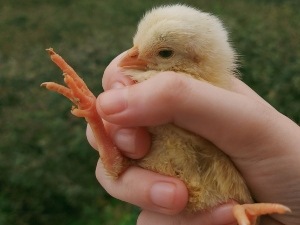
The early stages of a chick’s life is when the birds are the most fragile.
So, if something seems off with your bird during this time then you’d understandably be very worried, something like the chick flipping on its back
This article looks into why your chick may be flipping on its back
Table of Contents
Chick keeps flipping on its back:
Chicks may suffer from a variety of ailments and illnesses and these ailments and illnesses can cause your bird to develop some odd symptoms. But is a chick flipping on its back a symptom of a sickness?
Here is what you need to know about a chick flipping on its back:
The bird is uncoordinated:
Baby chicks may come out of their shells already being able to walk but this doesn’t mean that they always come out walking gracefully and with no issues.
Some birds will come out uncoordinated and may fall on their backs from time to time. The birds may also flail around a lot.
What to do:
This is nothing to worry about, a chick being uncoordinated is normal and is something that some birds will go through and some birds will not.
If left alone, and as long as there isn’t anything wrong with the bird, your bird will get used to walking and will eventually stop falling onto its back.
All these birds need is a little bit of time.
Vitamin E deficiency:
Another reason why your bird may be falling to its back may be because the bird has a vitamin E deficiency.
Vitamin E deficiencies in birds cause a variety of diseases including crazy chick disease (encephalomalacia) wry neck
Vitamin E in chickens is important for a variety of things in chickens including the functioning of nerves.
If the nerves in your bird’s legs aren’t functioning properly, because the bird has a lack of vitamin E, then your bird may start to fall on its back.
Other issues that can come up if your chick is lacking vitamin E in its diet include a decrease in egg production, a decrease in fertility, immune issues, and issues with the bird’s circulatory system.
Symptoms of a vitamin E deficiency in chicks include the inability to walk, decreased laying, poor growth, paralysis, muscle spasms, greenish-looking skin, the inability to control the head, enlarged hocks.
What to do:
Treating vitamin E deficiencies in chicks is quite easy, supplementing the vitamin into the bird’s diet will get rid of the bird’s issues.
You can supplement this vitamin into your bird’s diet through vitamin E supplements, or, you can give your birds more vitamin E rich foods to eat as a way of supplementing the bird’s diet.
Foods rich in vitamin E include spinach, sunflower seeds, pumpkin seeds, nestle, and dandelion.
You can alternatively give the bird multivitamins, liquid multivitamins can be added to your bird’s food or you can crush up multivitamin tablets and add these to your bird’s food.
If adding more vitamin E into your bird’s diet does not seem to be working then it is recommended that you take your bird to a licensed vet for an examination and treatment.
Taking your bird to a licensed avian vet is preferred over taking your bird to a regular vet.
If you enjoyed this article then you may also be interested in other bird related articles. Here are some articles that you may be interested in: Chick Keeps Flipping On Back And Shaking, Will A Single Chick Survive?, How To Make A Baby Chick Not Feel Lonely, Why Is One Chicken Always Alone, Why Is My Duck Laying On Its Side?, How To Get A Wild Duck To TrustYou, Why Do Ducks Splash In The Water, Why Is My Female Duck Squeaking, Male Duck Making High-Pitched Noise

